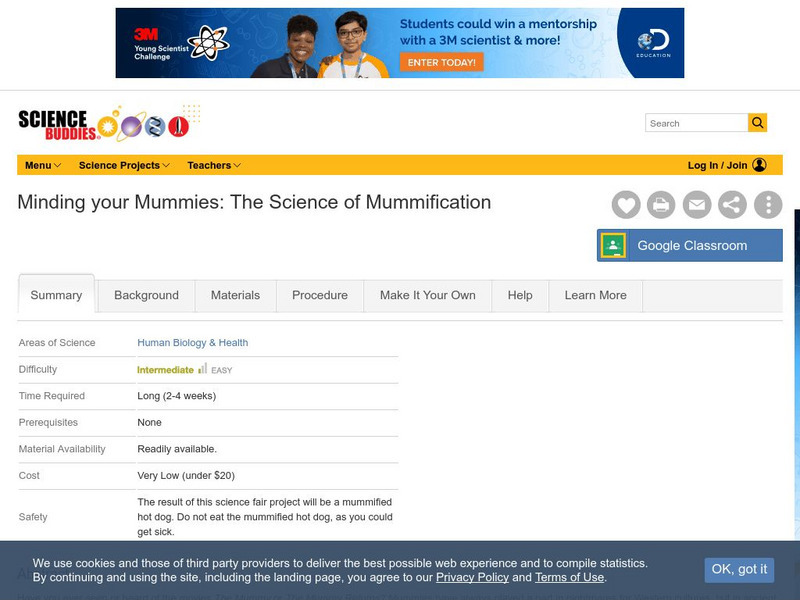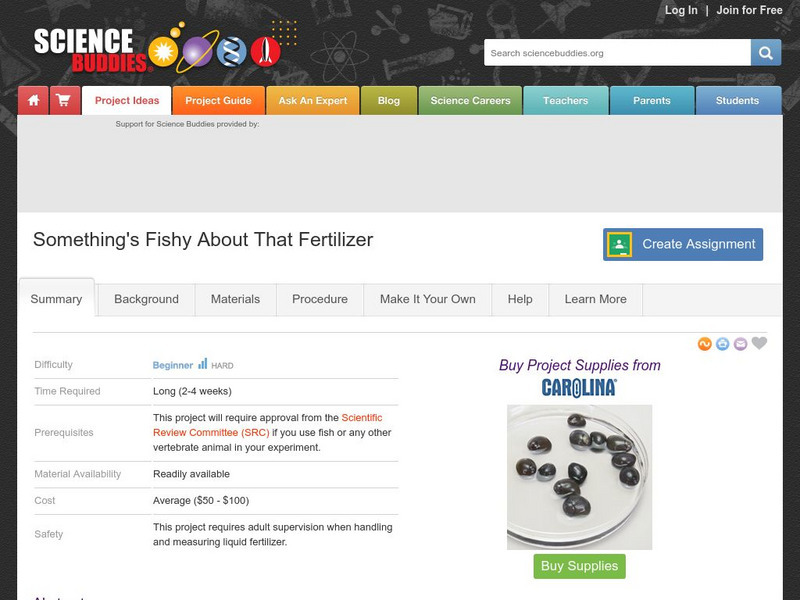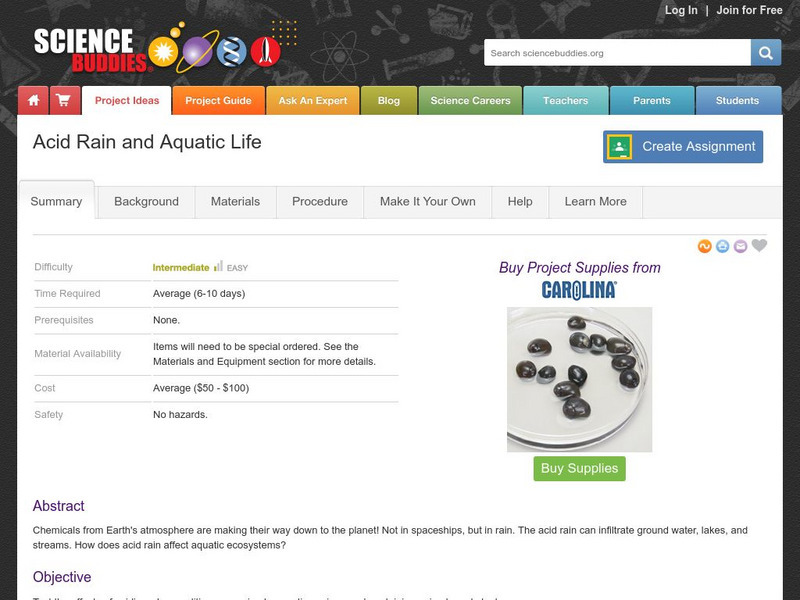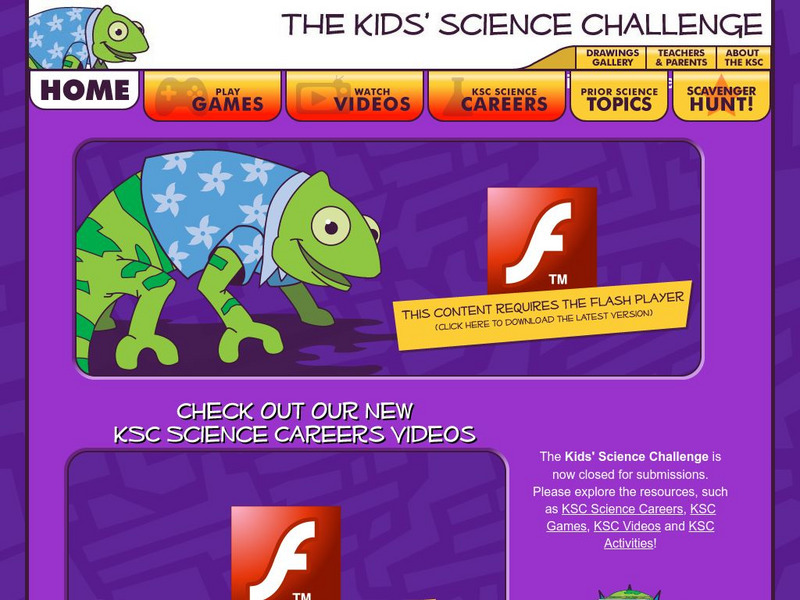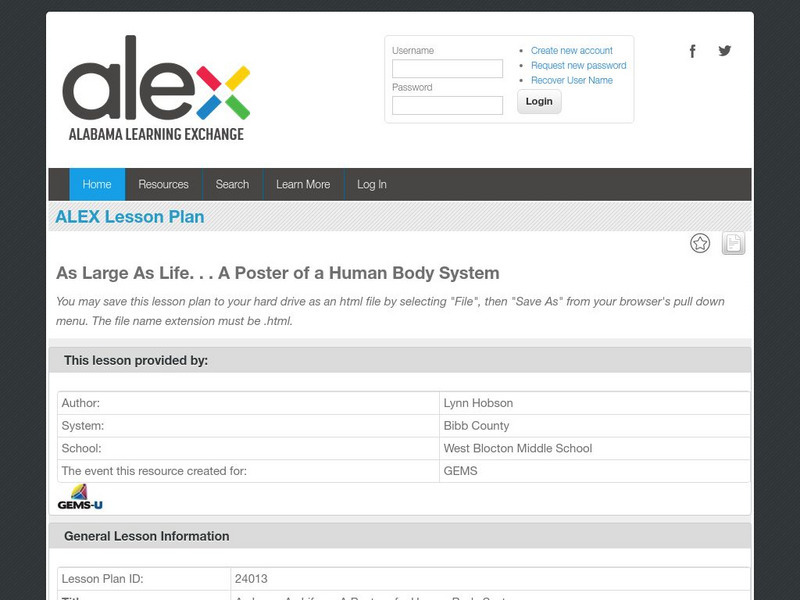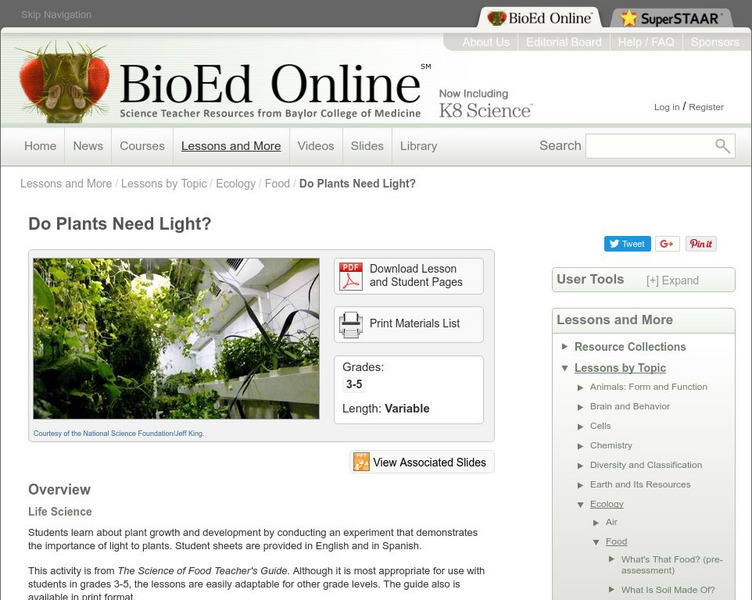Society for Science and the Public
Science News for Students: Ocean Animals Have Mushroomed in Size
Article reports on the increasing size of ocean animals over the millenia. Includes a list of key vocabulary.
Science Buddies
Science Buddies: Minding Your Mummies: The Science of Mummification
Mummies have always played a part in nightmares for Western cultures, but in ancient Egypt, mummification was a serious religious ritual. They believed that preserving human remains was necessary so that the previous owner could enjoy...
Science Buddies
Science Buddies: Something's Fishy About That Fertilizer
Did you know that when you use fertilizer in your garden, it can eventually reach a lake, stream, or pond? There are many different chemicals present in fertilizers. Learn how they affect the aquatic organisms in the ecosystem within...
Science Buddies
Science Buddies: Home Sweet Biome: How Do Plants Grow in Different Environments?
In this science fair project you will learn about biomes and how different climatic conditions affect plant growth. This can explain why some plants and animals are similar in different areas of the country, and in other parts they are not.
Science Buddies
Science Buddies: A Day in the Life of Your Heart
Heart rates can be determined by the amount of physical activity your body is engaging in. The more physically active you are, the faster your heart beats. You can measure the rate your heart is beating by taking your pulse. This science...
PBS
Pbs Learning Media: Understanding Character: The Life of Percy Julian
In this interactive lesson supporting literacy skills, students watch video dramatizations of Percy Julian's struggles with racism and how he refused to let it limit his possibilities in life.
Science Buddies
Science Buddies: Finding Phyla
Animals come in all shapes and sizes, each a small part of the amazing diversity of life. These differences can also help us to classify animals into different groups. Which group do you belong to? Do this experiment to investigate the...
Science Buddies
Science Buddies: Dog Toys: What Makes One a Favorite or a Flop to Fido?
It seems as though dogs, like people, have definite preferences for their play things. This fun project investigates what makes a toy interesting to a dog. In these experiments, you and your dog can have some fun while you learn about...
E-learning for Kids
E Learning for Kids: Science: Hawaii: What Are the Life Processes in Animals?
Kamoku is a boy from Hawaii who is interested in the seven life processes. Do you know what these are? Join Kamoku and discover them with him.
Science Buddies
Science Buddies: Acid Rain and Aquatic Life
Chemicals from the Earth's atmosphere are making their way down to the planet. Not in spaceships, but in rain. The acid rain can infiltrate ground water, lakes, and streams. How does acid rain affect aquatic ecosystems?
Science Struck
Science Struck: Facts About the Marine Biome
Describes the characteristics of the marine biome, the plants and animals that live in each of the four ocean zones, coral reefs and estuaries, the climate of the marine biome, and the marine food web.
Other
Kids' Science Challenge: Fun Educational National Competition!
A nationwide annual science competition for elementary and intermediate school students. Winning students are given the opportunity to work with a scientist to help bring their idea to life. Contest prizes include science trips, science...
Environmental Education for Kids
Eek!: Community Action & Citizen Science: Pearl Louise Pohl
Pearl Louise Pohl was a gifted teacher who believed strongly in environmental conservation and spent her life dedicated to environmental causes.
Science Struck
Science Struck: Information About the Marine Biome
Describes the characteristics of the marine biome and the plants and animals that live there.
Science Struck
Science Struck: Life Cycle of a Tornado
Describes the three stages of a tornado's life cycle.
Ducksters
Ducksters: Science for Kids: Coral Reef Biome
Kids learn about the coral reef biome. Much of ocean life lives in this important aquatic ecosystem.
Other
My Science Box: Food Webs
In this lesson, learners will choose an organism of their choice and research its life cycle, food chain, diet, and habitat, then predict how habitat change might affect the organisms living within it.
Alabama Learning Exchange
Alex: Amazing Adaptations Probing Pinnipeds
This is a technology-rich, hands-on science experiment exploring the world of pinniped adaptations using a digital probe as a data collection device.
TeachEngineering
Teach Engineering: Life in Space: The International Space Station
Students are introduced to the International Space Station (ISS) with information about its structure, operation and key experiments. The ISS itself is an experiment in international cooperation to explore the potential for humans to...
Alabama Learning Exchange
Alex: As Large as Life a Poster of a Human Body System
This is a student led exploration of the systems of the human body through art and self-expression. Groups will cooperatively develop a poster, the size of a fifth-grade student, and will accurately depict the assigned system of the...
Science Struck
Science Struck: Facts About Thomas Edison
Read about the life of Thomas Edison and his many inventions.
Science Struck
Science Struck: Learn All About the Ocean Food Chain
Read about the different predators, consumers, and producers that make up an ocean food chain.
BioEd Online
Bio Ed Online: Do Plants Need Light?
Plants need air, water, soil, and light to grow. Students learn about plant growth and development by conducting an experiment that demonstrates the importance of light to plants.
Alabama Learning Exchange
Alex: The Evidence of Chemistry
The students will learn to identify evidence that a chemical reaction has taken place. They will use the Internet to research evidence and find examples. They will look around their school and neighborhood for examples. They will perform...
Other popular searches
- 4th Grade Life Science
- Life Science Inquiry
- Life Science Vertebrates
- Life Science Experiments
- K 2 Life Science
- Life Science on Cells
- Life Science Lesson Plans
- Grade 4 Life Science
- Life Science Report Topic
- Australia Life Science
- The Life Science
- Life Science Lessons

